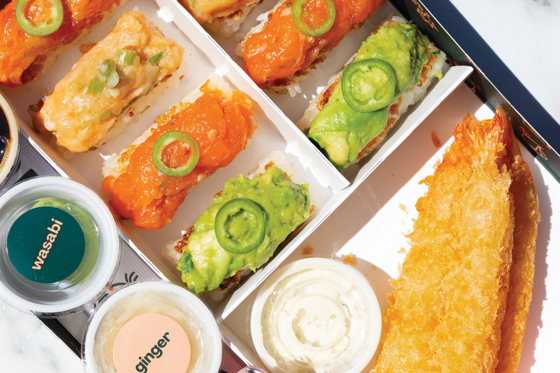“Every hotelier is trying to make in-room dining an experience,” said Robert Arigo, vice president of operations for New York-based M&R Hotel Management. “If you can’t deliver it and successfully satisfy the guest, then you need to find a quantified alternative. More and more in-room dining has morphed into gourmet, to-go delivery, and they’re doing that already, but the question is, are they doing it profitably?”
One alternative: Ghost kitchens, a trend that has accelerated amid the pandemic. Sometimes called cloud kitchens, hotels utilize them primarily for in-room dining, but also for catering and events. Sometimes they even provide to-go options for front desks or retail spaces.
Contributed by Jeanette Hurt
Hotels are using ghost kitchens to increase efficiency, maintain dining standards — and make that critical profit. “Ghost kitchens are definitely re-inventing the future of food and beverage, as well as delivery and delivery logistics,” said Tim Gjonbalic, founder and CEO of New York-based Butler Hospitality, a ghost kitchen service that works with M&R. “If you look at hotels, the flow of ordering hasn’t changed since Waldorf introduced room service.”

Longtime hotelier Sam Nazarian, founder of SBE Entertainment Group, is also president and CEO of C3 (Creating Culinary Communities). He just signed a deal with Ben Weprin’s Graduate Hotels to debut the Graduate Food Hall, a delivery-focused, hybrid digital kitchen concept, which will open in six Graduate properties by mid-2021. “The hotels we partner with make money serving the 30-minute community around them, and now they don’t have to put a full team in there just for the minimum revenue of in-room dining and breakfasts or catering,” Nazarian said.
Optimizing the space
Many hotels, even before the pandemic, weren’t optimizing their kitchen space, but the F&B infrastructure remained. “With our kitchens’ team and technology package we have been able to bring back in-room dining and banquets and catering,” Nazarian said.
Butler Hospitality operates its ghost kitchens only out of hotel kitchen spaces, solely for those hotels and neighboring hotels. C3 operates some ghost kitchens out of hotels, but also offers national brands like Umami Burger, Krispy Rice and Sa’Moto, for hotel guests and the community.
But there’s no delivery service. “Having delivery guys in your lobby is a concern from a security perspective, and the hotels also make no revenue off of that,” Nazarian said.
“We’re an integration at a deeper brand level,” Gjobalic said. “It’s a partnership.”
A ghost kitchen operator provides dining options and may also bring in the technology to fit into the hotel’s brand and operations. “If you (partner with a ghost kitchen), you’ll notice some differences to the in-room dining, but it will also feel and look very similar,” Gjonbalic said. “At Butler, we are separately branded within the hotels, and we communicate directly with the guests, even more efficiently than being physically in the building so that’s not a sticking point.”
“Whatever property management system they’re on or ordering system, we can complement that and layer on that,” Nazarian said. “We also can bring in six, seven eight or more brands that hotels can generate revenue from. We think this is even going to be more relevant post-COVID.”
Gjonbalic said that because Butler is open in different cities and can track dining preferences depending on where the customer is traveling. “I can’t tell you how many executives have said, ‘Our guests don’t want this,’ but I can actually tell them what people want.”
One hotel exec noticed all of the beverage revenue that was being generated through in-room dining, and as a result, got a liquor license to open a wine bar. “Now, they keep that sale completely,” Gjonbalic said.
Ghost kitchen management companies also stay on top of current dining trends, and because it’s not operating a dining space, they can change or add concepts and menu items more easily than traditional hotel restaurants.
“I see a lot of hotels building with a ghost kitchen concept in mind,” Nazarian said.
